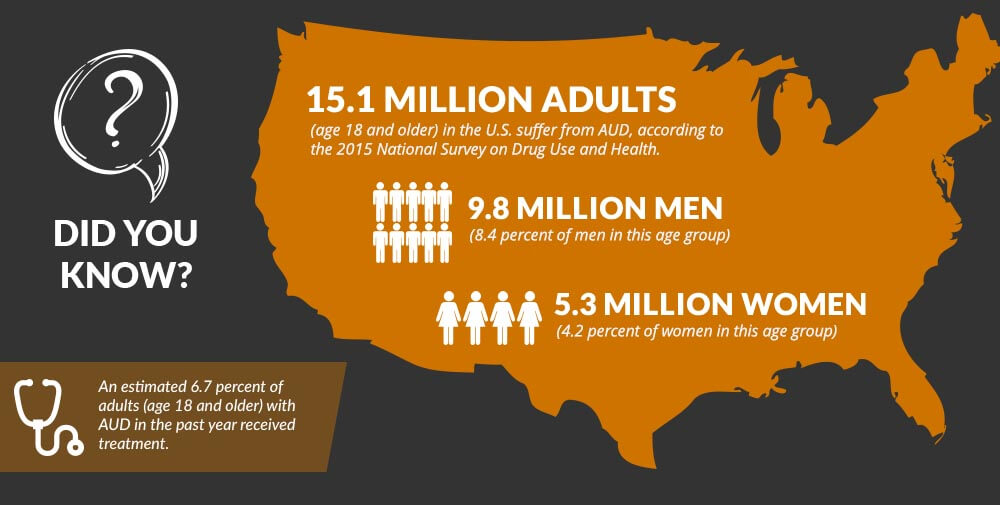Risk Factors of Alcohol Abuse
SEVEN KEY RISK FACTORS OF
ALCOHOL ABUSE
Alcohol Use Disorder (AUD) can lead to personal, professional, financial, medical and legal issues such as getting charged with driving while impaired. This is why you should know the common risk factors of AUD.

WHAT IS
ALCOHOL USE DISORDER?
Many people use terms such as alcohol abuse or alcoholism to refer to Alcohol Use Disorder.
The National Institute on Alcohol Abuse and Alcoholism (NIAAA) defines it as “a chronic relapsing brain disease characterized by an impaired ability to stop or control alcohol use despite adverse social, occupational or health consequences.”
- Had times when you drank more or longer than you intended?
- More than once, wanted to reduce or stop drinking – and tried to – but you could not do it?
- Wanted a drink so badly that you couldn’t think of anything else?
- During or after drinking, put yourself into situations where you could get hurt (such as driving while impaired)?
- Experienced withdrawal symptoms when the effects of alcohol wore off (such as nausea, sweating, shakiness, restlessness or trouble sleeping)?
- Spent a lot of time drinking, being sick or getting over the after-effects?
- Found that drinking or being sick from drinking interfered with home, family, employment or school?
- Stopped or cut back on activities that were once important or interesting to you, or which gave you pleasure, in order to drink?
- Continued to drink even though it caused trouble with family or friends?
- Had to drink more than you previously did in order to get the desired effect, or found that your usual number of drinks had much less effect than before?
According to the American Psychiatric Association Diagnostic and Statistical Manual of Mental Disorders, Fifth Edition (DSM-5):
MILD AUD
Presence of 2 to 3 symptoms
MODERATE AUD
Presence of 4 to 5 symptoms
SEVERE AUD
Presence of 6 or more symptoms
Recognizing
Seven Key Risk Factors
No single factor leads to Alcohol Use Disorder (AUD). Many different factors can interact and cause a person to develop the condition, while many people may never develop AUD despite the presence of several common risk factors.
Mental Health Disorders
Individuals who suffer from mental health disorders such as depression, bipolar disorder or social anxiety are more likely to develop AUD. Many people use alcohol or cope with their mental illness, or “self-medicate.” Also, a person with mental health problems may be unable to recognize problems with alcohol use, according to Addiction Center.
Personality Traits
According to an article published in 2017 in Frontiers in Psychiatry, the main personality traits related to the practice of binge drinking, or “heavy episodic drinking,” are high impulsivity, high sensation-seeking, anxiety sensitivity, neuroticism (hopelessness), extraversion and low conscientiousness. Many people who engage in binge drinking eventually develop AUD.
Trauma
Many people drink in the aftermath of a traumatic event such as an auto accident or an experience during military service. For instance, a person with Post-Traumatic Stress Disorder (PTSD) may drink to cope with jittery or “keyed-up” feelings, according to the National Center for PTSD.
Stress
A person may suffer from stress that is not severe enough to merit a clinical diagnosis, or a sub-clinical level of stress. Still, the personal may develop alcohol dependence issues in response to pressures brought on by their line of work and/or financial struggles, American Addiction Centers indicates.
Genetics & Family
“Alcohol dependence is a common, complex genetic disease, with many variants in numerous genes contributing to the risk of developing this disorder,” according to a Nature Reviews Gastroenterology & Hepatology review article. Children who grow up in homes where parents abuse alcohol are also more likely to develop AUD.
Social & Cultural
As the Foundations Recovery Network points out, some people who drink because they simply want to “fit in” with others in social settings ultimately develop a dependence on alcohol. Additionally, the acceptance of alcohol use and easy accessibility can also serve as factors.
Personal Drinking History
Individuals who begin drinking at an early age may be more likely to develop AUD as they grow older. As Addiction Center states, the use of alcohol “rewires the brain to desire and depend on alcohol, and these effects are cumulative.”
ResourcesIf you believe that you suffer from AUD or want to learn more, many helpful resources are available, including:
- Substance Abuse and Mental Health Services Administration National HelplineThis is a confidential, 24/7 hotline that provides treatment referrals and other information.
- Alcoholics AnonymousThe organization describes itself as an “international fellowship of men and women who have had a drinking problem.” AA holds meetings in communities throughout the country.
- National Institute on Alcohol Abuse and AlcoholismThis site has a wealth of information and links to resources.
Legal Problems Related to
Alcohol Use Disorder?
If you have encountered legal problems caused by alcohol use disorder such as being arrested for driving while under the influence of alcohol, you should seek help from an experienced attorney as soon as possible in order to protect your legal rights and, ultimately, your future.
The attorneys of Kurtz & Blum, PLLC, serve clients in Raleigh and throughout surrounding communities in and around Wake County.
Call or reach us online to discuss your case in a timely, free and confidential consultation.
Suite 710
Raleigh, NC 27601
Phone: (919) 832-7700











